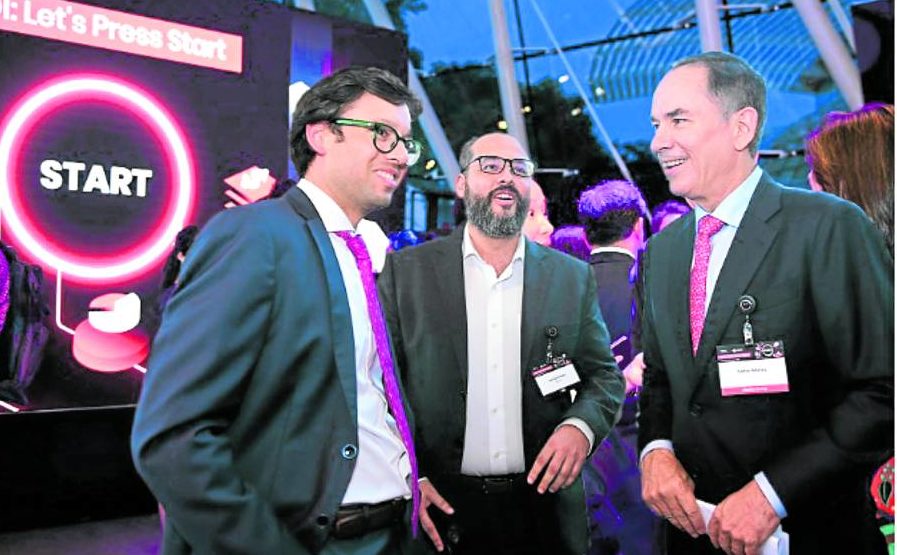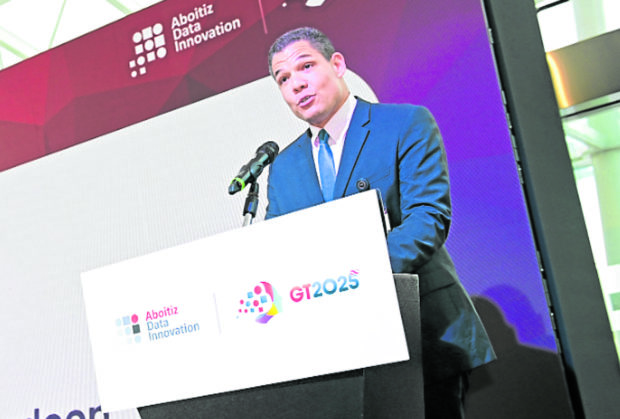Like mining ‘new gold’

SINGAPORE DEBUT Aboitiz Group CEO Sabin Aboitiz (right), ADI chief operating officer for power Luis Gonzalez (center) and Jera strategy officer Sidhartha Basu at ADI’s launch —Contributed photos
Singapore—A tech startup that harnesses the power of data science and artificial intelligence (DSAI) to solve everyday problems— part of the storied Aboitiz Group, which envisions this to be the “data backbone” of the Philippines—has debuted in this city-state.
Over a hundred partners and stakeholders attended Thursday night’s official launch of Aboitiz Data Innovation (ADI) at the ArtScience Museum within the Marina Bay Sands integrated resort here.
ADI is headed by David Hardoon, formerly chief data officer and head of data analytics group at the Monetary Authority of Singapore. While the Aboitiz Group had planned building a DSAI unit seven years ago, it took the hiring of someone like Hardoon to finally make this happen.
“The ability to process enormous amounts of data, which can only be done by computers, is changing everything. And so this is why it is absolutely necessary for us to start up Aboitiz Data Innovation if we wanted to change the way we operate our various businesses and make them more efficient, make our decisions more accurate and our results more positive,” Aboitiz Group CEO Sabin Aboitiz tells a group of journalists from Manila and Singapore.
“This is the great transformation that we’ve been talking about, the shift to a new Aboitiz ‘techglomerate’ driven by DSAI and designed to help transform economies and communities,” he adds.
Article continues after this advertisementAboitiz likens data to the “new oil or gold,” something valuable. As such, he says ADI is “a big part of Aboitiz’s future as data will be a big part of everybody’s future.”
Article continues after this advertisementWhat gives ADI an edge over other tech startups that similarly offer similar capabilities is that it is part of a conglomerate that has already deployed DSAI technology, particularly in its power, cement and banking businesses.
“ADI is revolutionizing how data is used across industries, sectors and borders,” says Hardoon. “Through tried and tested DSAI frameworks, ADI brings together the science and domain knowledge to enable companies to focus obsessively on its operationalization. We’re excited to see the business- and people-centric, quantifiable impact the activation of DSAI will have on customer services, operational efficiency and risk management.”
What for?
Hardoon shares some concrete examples of how the group has “operationalized” data for the benefit of stakeholders.
In cement manufacturing, to make sure that the chemical compound formulation is correct, he notes that the hardiness is typically curated for 28 days, after which it is destroyed to test how much compressive strength it can handle. So the manufacturer keeps on creating a lot of combinations, which may still not be right after 28 days.
Using DSAI, Hardoon says ADI has been able to predict the compression strength of the chemical compound.
“But we didn’t just take my word for it; we tested and we discovered that not only we truly are able to predict it; our standard deviation of compressive strength quality is more accurate,” Hardoon notes.
As a bonus, since deploying the solution to six cement manufacturing plants, Hardoon says energy consumption there have been reduced by 30 to 50 percent.
But Aboitiz’s favorite use case involves the group’s flagship power business. By using DSAI to better understand the power plants, early solutions built by ADI have been able to predict equipment fault five to 14 days before occurrence.
“It is fantastic if you can predict 14 days ahead [that] you’re gonna have a boiler leak, and it’s kind of big,” he says. It gives the power plant operator more time to prepare for disruptions.
Using data collected by drones, he says DSAI can also be used to predict when to prune overgrown trees away from transmission lines.
Building an ecosystem
But Aboitiz acknowledges that DSAI should be deployed around a bigger ecosystem, one that’s beyond the Aboitiz Group’s own businesses. This is to generate more accurate and meaningful data insights, he says.
ADI aims to offer its services to other institutions, businesses, industries and even the public sector. The group already has ideas on how to help the government.
“This administration now is very, very, very focused on digitization and data, therefore, it fits perfectly,” says Aboitiz, whom President Marcos has handpicked to lead his Private Sector Advisory Council.
With an ex-regulator and data analytics expert like Hardoon, the Aboitiz Group hopes to widen the ecosystem.
“We need to unlock the data and unlock the data in a way that upholds—I call it hygiene—security, governance, privacy. That is a nonnegotiable component,” Hardoon says.
ADI, which is domiciled in Singapore, is leveraging the position of the city-state as a leading technology hub to strengthen its commitment and foothold in the region over the next five years through increased investment and working with strategic local partners.
With the support of the Singapore Economic Development Board, ADI expects to hire more talent in Singapore and establish its DSAI advisory services and products across the region.
On Thursday, ADI signed a partnership with the National University of Singapore to boost research and development. It also teamed up with fintech firm Synfindo to embed its data exchange platform, Parlay, into the Synfindo framework to accelerate ADI’s “always share unless” approach to data. This will allow Synfindo financial institutions and fintech members to interact with data seamlessly and securely, so members can accelerate fintech and regulatory technology innovation more efficiently.
ADI also inked a new partnership with Japanese energy trading giant Jera (a strategic investor at AboitizPower) to explore the DSAI solutions within the energy and power sector, with the goal of attaining and maintaining power generation reliability, efficiency and environmental sustainability.
“We want to learn, we want to engage, we want to bring the best, and we want to take the best—which is plenty of it that we are building, we are validating, we’re testing out in the Philippines—to the rest of Asean, and if I could have my way, the rest of the world,” Hardoon says.
